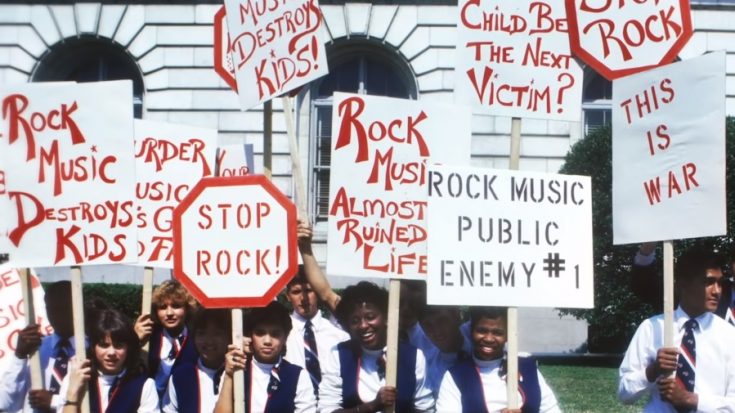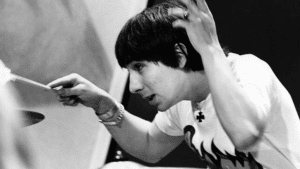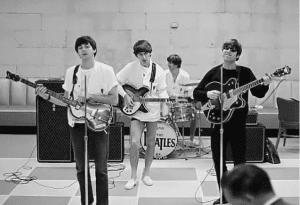Devil’s Music: Rock n’ Roll’s Rise From Judgement

Protesters against rock music - Vox / Youtube
Rock n’ roll didn’t exactly pan out as expected in the beginning. The loud, brash sonic quality, themes of depravity and excess, and rock stars wanting to live extravagant lives – this might have led to the assumption of rock being the devil’s music. Let’s take a look at how the once-rejected genre rose from stereotypes and became one of the largest revolutions in the music industry.
Historian Randall J. Stephens talks about it in his book, The Devil’s Music: How Christians Inspired, Condemned, and Embraced Rock ‘n’ Roll. Since he studied the relationship between rock musicians and their religious backgrounds (Pentecostal, in this case), Stephens pointed out how his particular examples were greatly influenced by their practiced faith. “I focus quite a bit on Pentecostalism; especially in chapter one, which focuses on the origins of rock ‘n’ roll,” he wrote. “I argue that, in part, the music and the worship styles of Pentecostal churches proved instrumental in inspiring the first generation of rock ‘n’ roll musicians. In particular, you have Elvis Presley, Jerry Lee Lewis, Little Richard, Johnny Cash, James Brown, B.B. King, and others who grew up in Pentecostal churches or attended Pentecostal worship services throughout their formative years. Fortunately, we have good documentation of them speaking about their youth in these churches and about how influential it was for them.”
Continuing, he added, “Elvis, for instance, grew up in the congregation of Memphis First Assembly of God, and he talked often about his admiration for the gospel quartets who came through, including the white Statesmen Quartet and the Stamps Quartet, along with African-American groups like the Golden Gate Quartet. Asked by a reporter about why he moved the way he did on stage, Elvis replied simply, ‘I just sing like they do back home.’ And continued: ‘When I was younger, I always liked spiritual quartets and they sing like that.'”
Seeing this, why did the faithful frown upon rock music? Stephens attributes it to the “bastardization” of gospel music as seen by religious folks, saying, “Well, they demonized it, in many cases, because of what they saw as a sort of sinful appropriation. Black and white Christians accused Ray Charles of blasphemy because of how he was secularizing sacred music. Blues legend Big Bill Broonzy certainly believed Charles had gone too far. A former pastor in Pine Bluff, Arkansas, Broonzy claimed that Charles had “got the blues,” but “he’s cryin’ sanctified. He’s mixing the blues with the spirituals.” Or, as the critic Hollie West said about Aretha Franklin, whereas she “once said Jesus, she now cries baby. She hums and moans with the transfixed ecstasy of a church sister who’s experiencing the Holy Ghost.”
Also, there seemed to be a racial aspect to the hatred of rock n’ roll music as well. Conservatives thought that their music was being stolen and turned into some kind of perverted version of worship, especially pointing fingers at concerts. “On the race end of things, because I focus largely on the American South, I looked at the white Southern Baptist Convention, Southern Presbyterians, and Southern Pentecostals, and found that their reaction to rock was almost uniformly negative and very often racialized. They attacked rock as ‘jungle music,’ ‘congo rhythms,’ and ‘savagery,'” he wrote.
https://www.youtube.com/watch?v=4n3r4NoX1-M
Apart from being a threat to religious conservatives, rock n’ roll also challenged the norms that most of the older community were used to – and held upon in the upbringing of their children. It was one thing to ridicule rock artists and bands for their looks, take, for example, The Beatles, but it also had to do with where the band came from. The Fab Four was nothing like how society imagined men, with bowl cuts and tight suits. This may seem very trivial now, but the band made a great deal of noise with the stimulus they provided to the masses.
“There was a lot of talk about how tight their clothes were and how their hair was effeminate. But most of all, evangelicals, and some Catholics had a pervasive fear about the hysteria that they inspired in young girls. In all of this, there was this view that teenagers looked to the Beatles as a kind of replacement for religion. And in worshipping the Beatles, they lost interest in the Bible and teachings of the church and the lessons of their parents,” Stephens added.
It took several decades before the majority of society began accepting rock music as just another evolution of art, but the reputation of being linked to the occult can never be erased from the annals of the genre. Things have gone better for music, in general, however, with more and more worship services and churches incorporating secular-inspired music to aid them in their desire to communicate and share their spirituality. In a way, things have just gone full circle for rock n’ roll and its accompanying infamy.













